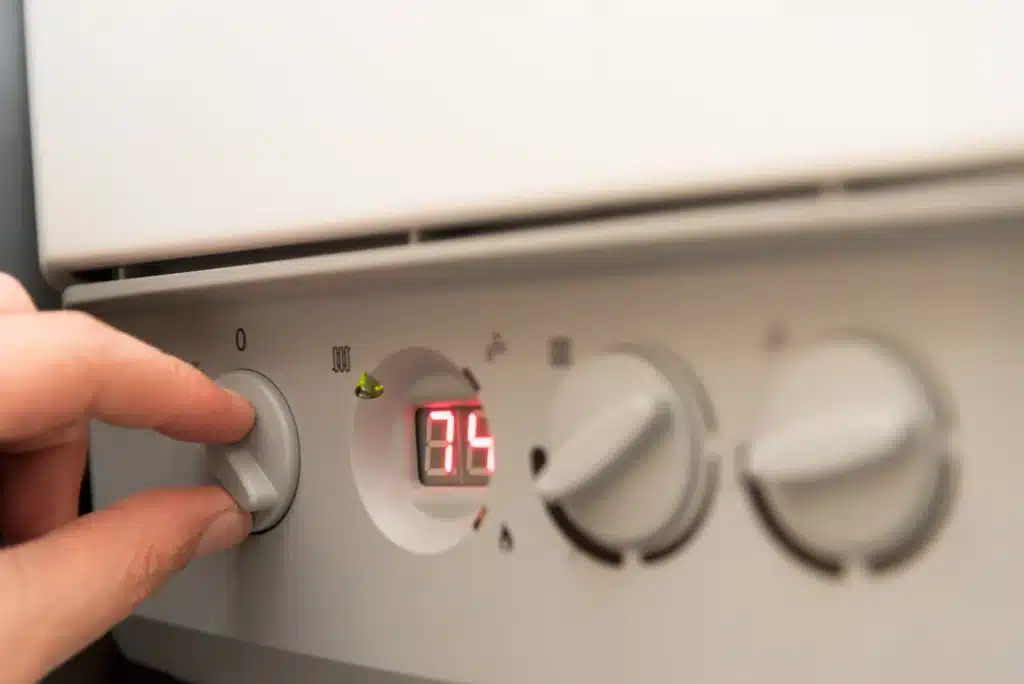We understand. An unexpected boiler breakdown can feel like a financial nightmare. But don’t panic — this guide is here to help you navigate a boiler replacement without breaking the bank.
We’ll explore the typical costs involved, from the boiler itself to installation, along with additional considerations that might affect the final price tag. We’ll also equip you with tips on choosing the right boiler for your needs and saving money in the long run. Plus, we’ll explore potential government support schemes to help ease the financial burden. Let’s work together to ensure your home stays warm and comfortable — even amidst rising living costs.
How much does a new boiler cost?
The price of a new boiler in the UK can vary depending on several factors, but you can expect to pay anywhere from £1,500 to £5,000 for the entire replacement process, including the boiler itself and installation.
So, a new boiler isn’t exactly a budget-friendly purchase. In today’s climate, a £1,000+ expense can feel like a major blow, with replacing a boiler is probably the last thing you want to spend money on. But here’s the thing: a new boiler is a worthy investment in your home’s comfort and, ultimately, your wallet.
Here’s a breakdown of the cost components:
Boiler Unit
The boiler itself ranges from £500 to £3,500, with the cost of combi boilers typically falling within the £1,500 to £3,000 range. Combi boilers are the most popular choice in the UK because they heat your water and home simultaneously, eliminating the need for a separate hot water storage tank.
Installation
Expect to pay an additional £1,000 to £1,500 for professional installation. A qualified Gas Safe registered engineer will ensure the new boiler is fitted correctly, safely, and meets all current regulations.
Additional costs to consider
While the boiler unit and installation form the core costs, there might be additional considerations depending on your specific situation:
- Flue upgrades: The flue is the pipe that expels exhaust fumes from your boiler. If your existing flue needs modification or replacement, factor in additional costs.
- Magnetic filter: Installing a magnetic filter can trap metal debris in your central heating system, improving boiler efficiency and potentially extending its lifespan.
- System upgrade: In some cases, replacing your boiler might expose compatibility issues with your existing pipework or controls. Upgrading these components will add to the overall cost.
Planning for the future: Choosing the right boiler
When selecting a new boiler, consider factors beyond just the upfront cost. Here are some key points to keep in mind:
- Boiler efficiency: Opt for an A-rated boiler for maximum energy efficiency. While these models might have a slightly higher initial cost, you’ll save money on your energy bills in the long run.
- Boiler size: The appropriate boiler size depends on the size and insulation level of your home. Choosing the correct size ensures optimal performance and avoids unnecessary energy consumption.
- Warranty: A good boiler warranty (typically 5-10 years) provides peace of mind and protects you from unexpected repair costs.
Financial assistance: Government boiler replacement schemes
While a completely free boiler replacement might be rare, there are government schemes in place to help certain households offset the cost. The Energy Company Obligation (ECO) scheme offers grants for boiler replacements and upgrades, particularly for low-income households meeting specific criteria such as receiving certain benefits. For instance, households that get Pension Credit or Child Tax Credit are often automatically eligible for free boiler replacements under the ECO scheme. This is because the scheme is funded by energy companies and aims to reduce fuel poverty by making homes more energy-efficient.
However, even if you don’t qualify for a completely free boiler, the ECO scheme might still be able to help. Some households can receive a grant that covers part of the cost of a new boiler, as long as the existing boiler is inefficient (usually below 86% efficiency) or older than 8 years.
To find out more about your eligibility for the ECO scheme, you can contact your energy supplier or check with organisations like the Eco Home Network
The bottom line
In conclusion, replacing your boiler is an investment that can improve your home’s comfort, and energy efficiency, and potentially save you money on heating bills in the long run. By considering the factors outlined in this guide, such as boiler type, size, efficiency rating, and potential government grants, you can make an informed decision that fits your needs and budget.
Ready to upgrade your heating system? Here at WaterGuys, we specialise in local boiler replacements, offering a stress-free experience from initial consultation to expert installation. Don’t wait for winter to catch you unprepared — contact WaterGuys today.
